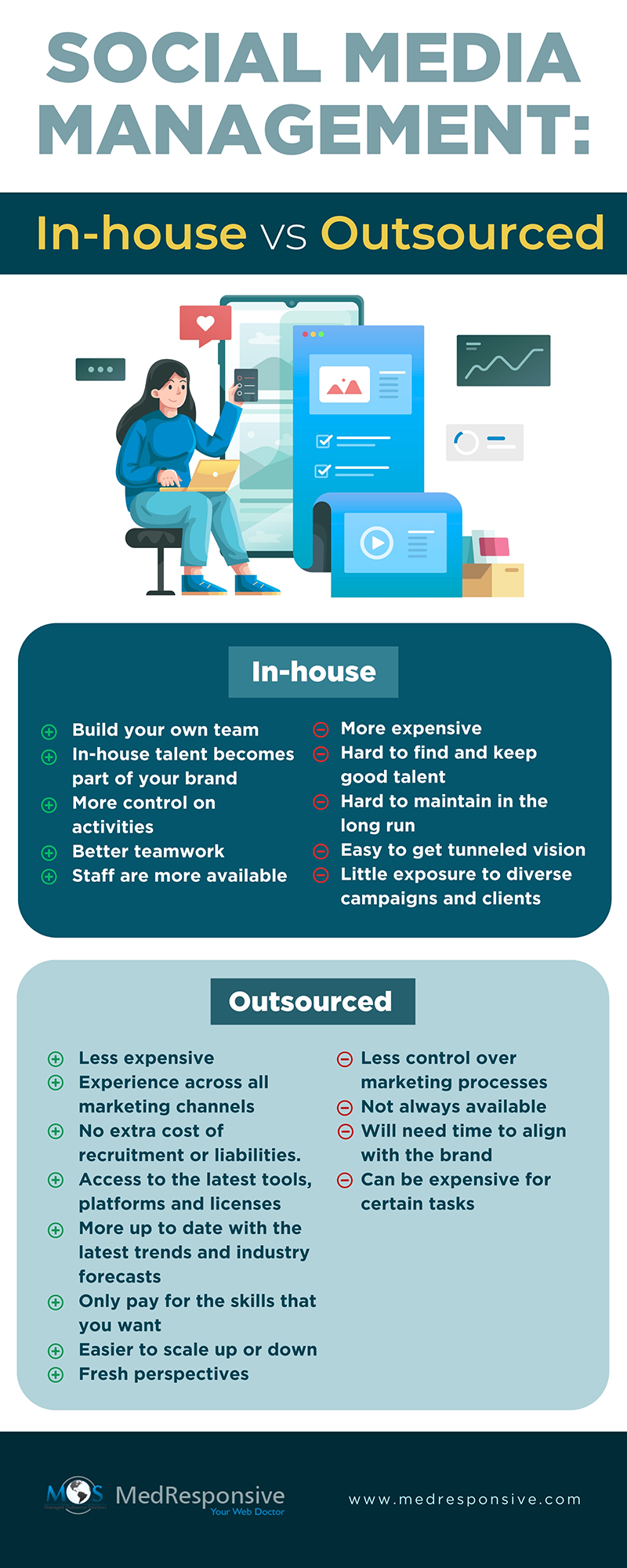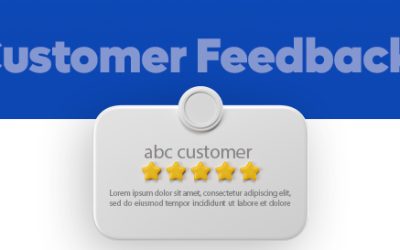More than half of the world’s population are on social media—liking, commenting and sharing petabytes of content, every second. This opens up an unprecedented opportunity of accessing a vast sea of potential customers for businesses and at the same time, a big question as well:
Should you manage your social media in-house or outsource it?
Social media once was D.I.Y—anyone with basic computer knowledge could start with a business page, throw some money in and sit still while the platform does the magic for you. Nowadays, social media has become more complex than ever and this leaves the business owners in a dilemma regarding whether to manage it on their own or to outsource it.
Social media has now matured, with platforms shifting to intricate advertising and data collection models, making it harder to succeed than it was once. This has made the field super competitive, leaving only a few who have successfully deciphered the social media structure and are capable of translating actions into sales.
Now, let’s get into addressing the elephant in the room—in-house or outsource?
What Is In-house Social Media Management?
In-house management means your company’s employees (an in-house team) will handle all tasks related to social media—ranging from content creation to performance tracking.
Pros of In-house Social Media Management
- Brand Alignment: When you have an in-house team, your employees will be more aligned to the company’s vision, goals and audience way better than an external agency. They are naturally in sync with the brand’s voice, so there will be consistency across all social media content.
- Direct Communication: With an internal social media team, there is no need to wait for feedback or set up meetings in different time zones. Also, it allows for a greater level of control and oversight. You will be more involved in the happenings which means you can make informed decisions on marketing strategies.
- Enhanced Collaboration: Having an in-house team facilitates greater collaboration and team play, as they can work with other departments inside the company to create marketing campaigns and such, without having to wait for an external team who could have conflicting ideas which could lead to poor performance.
Cons of In-house Social Media Management
- Limited Expertise: The biggest challenge is not knowing if your social media lead and the team are constantly keeping up with the ever-evolving social media trends, algorithms, and best practices. An in-house team may have to handle other responsibilities, and might lack the specialized knowledge required to keep up.
- Resource Intensive: Setting up a specialized social media team is a costly affair. Salaries, tools, and training expenses can quickly add up which can be draining, especially for small businesses.
- Daunting Task: Social media management is very demanding. You will have to spend a lot of time and effort in managing your team, overseeing their strategies and making sure they run effectively, returning the desired results. Juggling these roles can be overwhelming, leading to reduced creativity and productivity.
What Is Outsourced Social Media Management?
Simply put, social media management services services can be obtained from external agencies to handle your social media tasks. Outsourcing brings expertise, advanced tools and fresh perspective onto your digital strategy.
Pros of Outsourced Social Media Management
- Access to Expertise: Third party agencies are usually experts in their own domain, providing access to expertise that you may not enjoy with an in-house team. By leveraging their services, you may be able to plan and execute campaigns much more efficiently, without having to spend time training your in-house team.
- Cost-effective: Outsourcing to a team in Asia or Africa with cheaper labor costs, can bring down costs and also eliminate the need to maintain an in-house team and their expenses, such as salaries, benefits, and insurance. It also cancels the need to invest in office space, equipment, and infrastructure, resulting in lower overhead costs.
- Scalability and Flexibility: Outsourcing will enable you to scale up or down in response to changing demand without hiring additional staff. During an urgent or a busy period, you can rapidly increase any department of social media (content writers, design or digital marketers) and then scale it back after the demand has subsided.
Cons of Outsourced Social Media Management
- Communication Challenges: Even though outsourcing can save time, working with external teams may lead to delays or misalignment in content creation and campaign strategies. Without direct involvement of the department head/owners, the content may fall short of delivering the exact message it was intended to.
- Brand Learning Curve: It is normal for outsourced agencies to fully understand your brand’s voice and its audience. This delay can potentially impact the authenticity of your posts. Without having an individual from your team constantly monitoring the agency for the first few days, your brand’s voice may get lost in the scuffle.
- Less Control: One of the main issues that may affect businesses worldwide is relinquishing some control over your social media strategies to the outsourced agency, which may be a concern for the internal team as it raises concern over security and privacy among collaboration issues.
Conclusion—Which One Is Better?
So, now the million-dollar question: should you outsource or manage social media in-house?
The answer: in a sentence, it totally depends upon your business size, objectives, and available resources.
- Small Businesses: For SMBs, outsourcing makes sense taking into account their budget constraints and the need for expertise without hiring full-time staff.
- Medium to Large Enterprises: For businesses that are capable of spending a few dollars, a hybrid model—utilizing an in-house team for brand-centric tasks and a third-party team for diverse campaigns—can yield the best results.
- Highly Regulated Industries: For businesses that require strict compliance or are controlled by government rules—like finance, healthcare or gaming—In-house teams might be the better option.
Deciding whether to manage your business’s social media in-house or handing it over to a professional digital marketing services company depends on these considerations: goals, budget, expertise and scalability. While in-house management offers brand alignment, authentic representation, and hands-on learning, outsourcing provides time and cost savings while making sure your social media presence is always a priority.
Therefore, by carefully analyzing the pros and cons of each approach, you can choose the right one that will align with your brand’s goals and connect with your audience, taking your company to the top of the competition.





